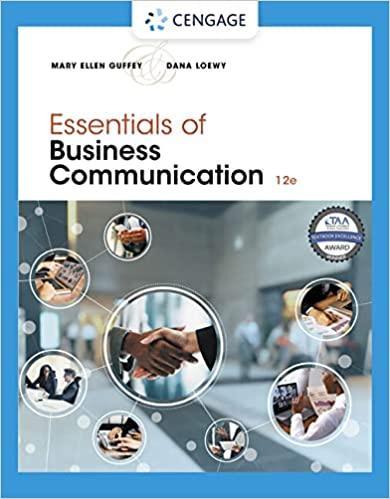Question
Read the letter and look for persuasive appeals in Buffet's letter. -select five sentences that show pathos, logos, or ethos. -Describe the analysis of your
Read the letter and look for persuasive appeals in Buffet's letter.
-select five sentences that show pathos, logos, or ethos.
-Describe the analysis of your appeal.
Example:
Example 1: From the start, Charlie and I have believed in having a rational and unbending standard for measuring what we have - or have not - accomplished. That keeps us from the temptation of seeing where the arrow of performance lands andthenpainting the bull's eye around it.
Appeal: Ethos - Credibility, Language
Analysis: Buffet's use of phrases such as "Charlie and I" keeps the tone informal and friendly. By sharing their concern for ethical measurement, they establish the credibility of the data reported.
Warren Buffett's Letter
BERKSHIRE HATHAWAY INC.
To the Shareholders of Berkshire Hathaway Inc.: Berkshire earned $4.0 billion in 2018 utilizing generally accepted accounting principles (commonly called "GAAP"). The components of that figure are $24.8 billion in operating earnings, a $3.0 billion non-cash loss from an impairment of intangible assets (arising almost entirely from our equity interest in Kraft Heinz), $2.8 billion in realized capital gains from the sale of investment securities and a $20.6 billion loss from a reduction in the amount of unrealized capital gains that existed in our investment holdings. A new GAAP rule requires us to include that last item in earnings. As I emphasized in the 2017 annual report, neither Berkshire's Vice Chairman, Charlie Munger, nor I believe that rule to be sensible. Rather, both of us have consistently thought that at Berkshire this mark-to-market change would produce what I described as "wild and capricious swings in our bottom line." The accuracy of that prediction can be suggested by our quarterly results during 2018. In the first and fourth quarters, we reported GAAP losses of $1.1 billion and $25.4 billion respectively. In the second and third quarters, we reported profits of $12 billion and $18.5 billion. In complete contrast to these gyrations, the many businesses that Berkshire owns delivered consistent and satisfactory operating earnings in all quarters. For the year, those earnings exceeded their 2016 high of $17.6 billion by 41%. Wide swings in our quarterly GAAP earnings will inevitably continue. That's because our huge equity portfolio - valued at nearly $173 billion at the end of 2018 - will often experience one-day price fluctuations of $2 billion or more, all of which the new rule says must be dropped immediately to our bottom line. Indeed, in the fourth quarter, a period of high volatility in stock prices, we experienced several days with a "profit" or "loss" of more than $4 billion. Our advice? Focus on operating earnings, paying little attention to gains or losses of any variety. My saying that in no way diminishes the importance of our investments to Berkshire. Over time, Charlie and I expect them to deliver substantial gains, albeit with highly irregular timing. ************ Long-time readers of our annual reports will have spotted the different way in which I opened this letter. For nearly three decades, the initial paragraph featured the percentage change in Berkshire's per-share book value. It's now time to abandon that practice. The fact is that the annual change in Berkshire's book value - which makes its farewell appearance on page 2 - is a metric that has lost the relevance it once had. Three circumstances have made that so. First, Berkshire has gradually morphed from a company whose assets are concentrated in marketable stocks into one whose major value resides in operating businesses. Charlie and I expect that reshaping to continue in an irregular manner. Second, while our equity holdings are valued at market prices, accounting rules require our collection of operating companies to be included in book value at an amount far below their current value, a mismark that has grown in recent years. Third, it is likely that - over time - Berkshire will be a significant repurchaser of its shares, transactions that will take place at prices above book value but below our estimate of intrinsic value. The math of such purchases is simple: Each transaction makes per-share intrinsic value go up, while per-share book value goes down. That combination causes the book-value scorecard to become increasingly out of touch with economic reality. 3 In future tabulations of our financial results, we expect to focus on Berkshire's market price. Markets can be extremely capricious: Just look at the 54-year history laid out on page 2. Over time, however, Berkshire's stock price will provide the best measure of business performance.
Step by Step Solution
There are 3 Steps involved in it
Step: 1
1 Sentence The accuracy of that prediction can be suggested by our quarterly results during 2018 Appeal Logos Logical reasoning Analysis Buffett appea...
Get Instant Access to Expert-Tailored Solutions
See step-by-step solutions with expert insights and AI powered tools for academic success
Step: 2

Step: 3

Ace Your Homework with AI
Get the answers you need in no time with our AI-driven, step-by-step assistance
Get Started


